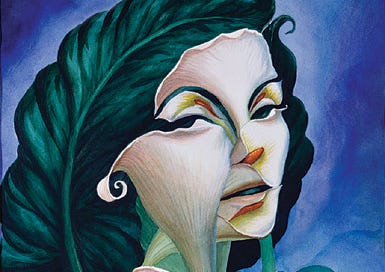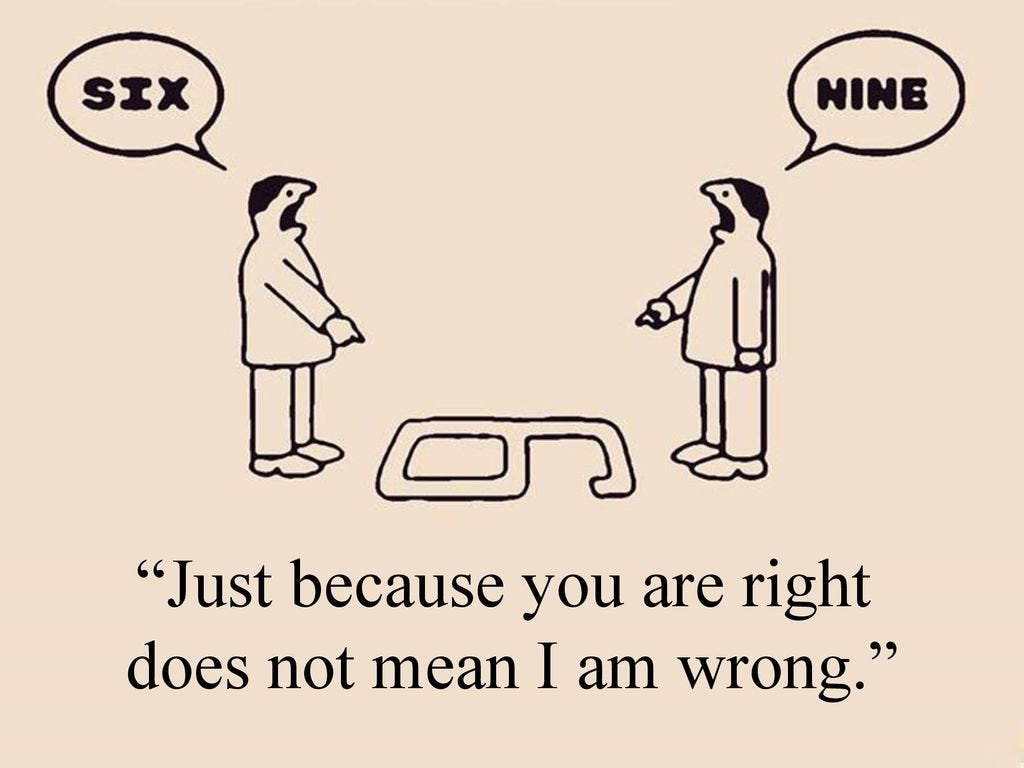In art: Surrealist painter Octavio Ocampo has created works like this one for unknown folks as well as famous figures, from President Jimmy Carter (commissioned in 1979 by President of Mexico, Jose Lopez Portillo) to Jane Fonda (two actually) and Cher (used for an album cover later pulled by Geffen Records) among others. He has reproduced iconic artworks - Mona Lisa with fanciful elements added - and various Jesus portraits, along with many more conceptual images. I appreciate his cleverness and the intense visual work involved, the attention given to details, often illuminating things I hadn’t considered about the subject. They are fascinating though not all necessarily lovely, which I think is the ultimate metaphor about perspective; it is a useful and certainly important objective yet a tricky thing to always embrace. No one likes to be even perceived as wrong, much less exposed as such. I think we can get over this concern if we try what Ted Lasso recommended - being more curious and less judgemental.1
In books: I chose to buy Gabrielle Zevin’s Tomorrow and Tomorrow and Tomorrow when I was leaving Miami International Airport a few weeks ago, after having finished the novel I’d brought on my trip, mostly because of its eyecatching cover - rainbow shadowed all-caps lettering incongruously plastered over Hokusai’s iconic wave painting. I don’t really pretend anymore to not judge books by their covers; I have given away unattractive copies of novels I loved then purchased versions I liked the look of more.2 Anyway. The plot sounded interesting too, and I was captivated immediately by the main characters, Sam and Sadie, who met at the start of the 80s as young teens, bonding over early video games, but somehow became estranged until a chance meeting years later across the country. It feels at first like a straightforward story of friendship (and retro video games) but we quickly realize we’re only seeing Sam’s perspective, and he’s not even entirely forthcoming with pertinent details. Soon Zevin switches to Sadie’s version, filling in blanks that Sam either didn’t know or chose not to include. Later, as the game creation plot builds, we see yet another side of their relationship through the eyes of Marx, Sam’s roommate/friend and ultimate business partner. Everything about this book felt real and poignant, almost painfully so, plus I learned things about the intricacies of video game design that I never realized I cared about. Zevin exquisitely crafts layers that reveal breathtaking truths; I found myself suddenly weeping at revelations that I ought to have expected, though not because they were predictable in trite or tiresome ways. I think we’ve become so conditioned to expect twists that when natural, necessary endings unfold, we are caught off guard. When you consider the title and where it comes from, as I did in the middle of this novel there might be chills, and you might not want to keep reading. But do, because Zevin will surprise you again. And again. And again.
In movies: I treated myself to this intriguing film last week when it popped up on my hulu recommendations. Perfect Days is a seemingly simple story about a Japanese man who lives a seemingly uncomplicated life, seemingly content with his daily routine and the predictable precision & utility of his job as a public toilet cleaner in Tokyo’s Shibuya district. And, you could spend the two hours watching and be generally satisfied with that plain assessment: the film was originally commissioned as a way to promote The Tokyo Toilet project that was installed ahead of the 2020 Summer Olympics; the organizers envisioned a series of mini-films or a documentary highlighting the city’s routine dedication to cleanliness as reassurance to tourists after the COVID-19 pandemic. However, German writer/director Wim Wenders decided to create a fictional narrative around one man and his life outside the job, which brings not only a necessary humanity to service workers but also reminds us of the depth all of our lives possess, if we pay attention. We’re invited to notice the details of Hirayama’s3 world - how he awakens each day without an alarm; the plants he meticulously greets every morning; his collection of cassette tapes; the books he reads - as well as his interactions with everyone he encounters. What is the significance of these details? What difference does it make how we begin and end our days? Why does this man rarely speak? People around Hirayama react differently to his deliberate, calm, thoughtful actions - some call him weird, some dismiss him, some don’t see him at all; Wenders suggests that those behaviors say more about the others than about Hirayama. This is a meditative movie, though not one lacking a plot. There are possibly more conflicts arising in these few weeks in Hirayama’s world than we see in an entire typical Hollywood action flick. When you realize that, and you think about the use of Lou Reed’s “Perfect Day”4 as a backdrop in the soundtrack, you could start to see his - and your own - life in a different light.
Everyone is generally onboard with the idea that perspective matters. However, we also have to remember that we see things differently from others because of our backgrounds, experiences, values, and while those are valid reasons to be strongly convicted in our point of view, we could still not be entirely correct in any given circumstance. We could even be wrong. I know. It’s such an ugly word. It even feels awkward to say, at least in English.
When I taught US History, I used this image to discuss the idea of perspective. Everyone agrees wholeheartedly until I assert that sometimes there is only one right way to look at something .
We talked about situations in which it would be wholly inaccurate to say that figure is a six and not a nine (a fallen apartment number, looking at a desk number5 from the opposite side, someone even mentioned it could be a lower case g). I made clear in our discussions that it didn’t mean a wrong person was bad or stupid, but they were still wrong.
The nuanced takeaway6 is that we all need to be a touch more patient when we hear someone asserting their ‘belief’ [opinion] as The Truth. We must practicing asking things like “What makes you think that?” “Where did you get your information?” If our goal is to live peacefully, we will eventually have to share some space with people who make us clench our jaws when they speak. If we land on assuming good intent7, we can take a deep breath, start to gather some insight, and maybe exhale a bit of grace.
Not really a Walt Whitman quote but still a pretty solid way to approach life that I think he’d support
I would never have expected I’d be an apologist for the Leonardo DiCaprios of the world but here I am, apparently.
Played with utter loveliness by the talented Kōji Yakusho
During our COVID school days, I labeled classroom desks with stickers so we could easily arrange & track student seating. Turns out there was a useful upside to education during the pandemic! #LaughingCrying
Which teenagers absolutely can get, so do better, Obstinate Grown-ups out there
I KNOW this is a huge ask in our Time of Willful Ignorance but you might be surprised at how disarming it is to respond in these ways to mean-spirited people - they either have to admit they intended to be nasty, or they will answer honestly (“Uhh, I don’t really know…”) and then you can have a discussion. Or, they’ll walk away madder but at least then they’re gone. #Winning







That film is on my list of things to watch. There's something so satisfying about boiling life down to to essentials and creating space to enjoy little pleasures. I loved the movie about Dick Proenneke for the same reason and always get sucked into it when it reairs on PBS.
The Zevin book is on my list, too!
Understanding perspective lets us appreciate context, people are often so binary in their thinking, your post reminds us to avoid that trap.
Here's an article I loved that discusses the problem with people's OPINIONS: https://www.houstonpress.com/arts/no-it-s-not-your-opinion-you-re-just-wrong-updated-7611752